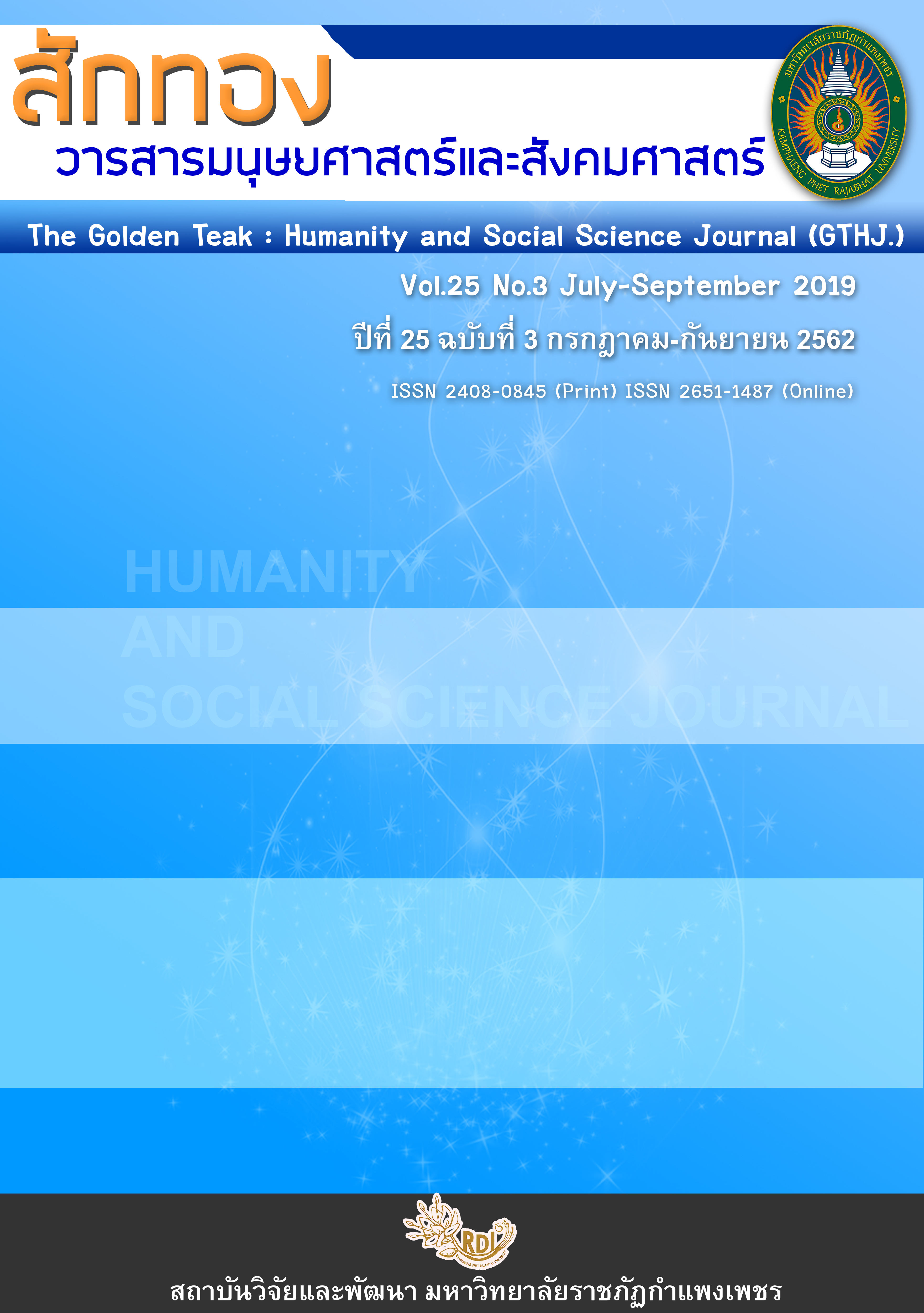The Effect of Experiential Learning Activities by Using Role Models in Public Mind Behaviors of Elementary 4-6 Students Watyang (Meemanawittaya) School in Phitsanuloke Province
Main Article Content
Abstract
The objectives of the study were : 1. study about student’s public mind and 2. to experiment the experiential learning activities by using role models. There eighteen students from primary school second semester year 2560 at Wat Yang School (Memanawittaya), Phitsanulok that participated in are volunteer from Buddhism club in the school. This research was Quasi-Experimental by using many tools, for example, pretest-posttest, group activities, the behavior observation and learning activities forms. Statistics that analysis this research contain with average, aviation and standard aviation. The result of this study provided that before the students took part in this research, their average score in public mind was 154.50. In percentage, it was only 47.69 percent which was very low based on the standard criteria. After they did all the learning activities, their average score were up to 249.50 as in percentage was 77.01 percent which have a high level of public mind.
Article Details
บทความที่ได้รับการตีพิมพ์เป็นลิขสิทธิ์ของวารสาร สักทอง : วารสารมนุษยศาสตร์และสังคมศาสตร์ สถาบันวิจัยและพัฒนา มหาวิทยาลับราชภัฏกำแพงเพชร
ข้อคิดเห็นใดๆ ที่ปรากฎในวารสารเป็นวรรณกรรมของผู้เขียนโดยเฉพาะ ซึ่งมหาวิทยาลัยราชภัฏกำแพงเพชรและบรรณาธิการไม่จำเป็นต้องเห็นด้วย
References
company.
_______. (1989). Social Learning Theory. Englewoo Cliffs, New Jersey : Prentic-Hall.
Chun-See, N. (2003). Symbolic modeling through literary minitext to develop the public mind of second grade students. Master’s thesis, Srinakharinwirot University.
Dudsdeemaytha, J. (2018). Concerning about children nowadays who focus on getting knowledge for competition and have lack of public mind. [Online]. Available : http://www.manager.co.th/Family/ViewNews.aspx?NewsID=9530000014128
[2018, January 18].
Khowtrakun, S. (1994). Educational Psychology. (3 nd ed.). Bangkok : Chulalongkorn University.
Ministry of Education. (2008). Basic core curriculum B.E 2551. Bangkok : United Agriculture
Conference in Thailand.
Parnichprarincha, T. (1996). Research methodology. Phitsanulok : Faculty of Education, Naresuan University.
Rakngam, C. (2001). Predicting future education based on developing plan. Veridian E-Journal,
11(3), 52.
Thamrongsotthisakul, W. (2017) . The reflection on the concepts of instructional package learning activity package and learning package. Journal of Education Naresuan University, 19(3), 362.
Office The Education Council. (2009). Education reform in 20th century (2009-2018).
Bangkok : Bureau of Academic Affairs & Ministry of Education.
Office The Nation’s Education Commission. (2002). Assessment guidelines in class, sciences subject of Basic Learning Curriculum 2001. Bangkok : Express Transportation Organization of Thailand.
Office of the Basic Education Commission. (2008). Guild lines for Learning Management
based on Basic core curriculum B.E 2008. Bangkok : United Agriculture Conference
in Thailand.
Sutthirat, C. (2009). 80 Management Innovations Facilitating Student Centered
Learning. Bangkok : Deanex Intercorperation.
Traimingkolkul, P. & Chattraphorn, S. (2006). Reseach Design. (5 th ed.). Bangkok :
Kasetsart University.
Uthathit, R. (2016). The effects of Procedure to Promote Public Mind Activities by using Bandura Model of Social Study, Religion and Culture Department for Prathomsuksa 5 students. Master’s independent study, Naresuan University.
Wajee, J. (2016). The factors on public mind behavior of the secondary school students in Bangkok. Master’s thesis (Social Sciences for Development), Rambhai Barni Rajabhat University.
Wasi, P. (1999). Vision of Learning Process in Basic Education Curriculum. Veridian E-Journal,
2(1), 8-11.
Wiriyaprayune, S. (1986). General Psychology. Bangkok : Thai Wattana Panit Press.
Worrakamin, D., et al. (2016). Analytical Thinking and Public Minds for Developing good potential in Thai student Project. Bangkok : The Thailand Research Fund (TRF).


